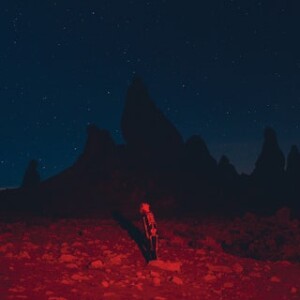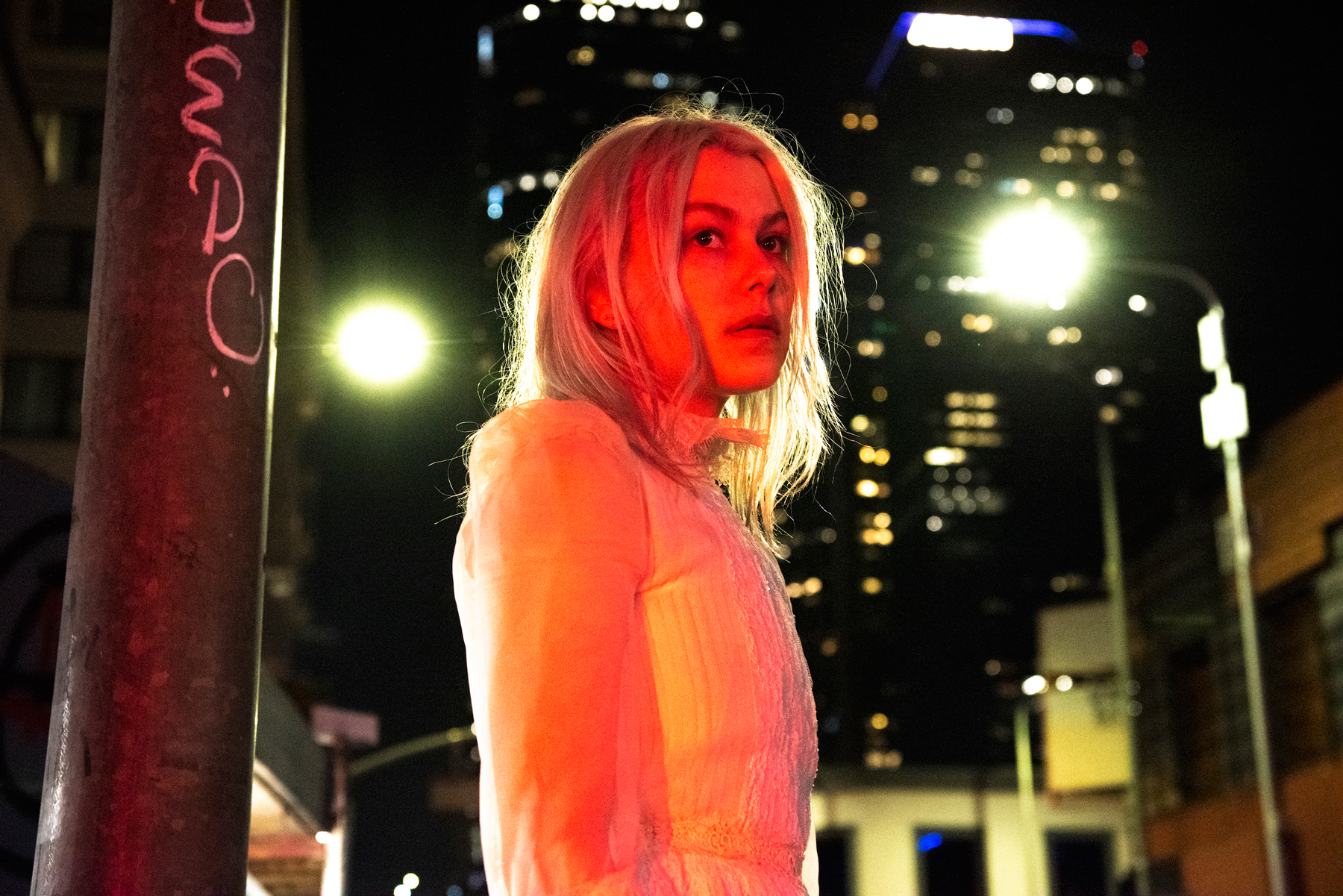Phoebe Bridgers – Punisher
Phoebe Bridgers is back with a highly anticipated follow up to her 2017 effort Stranger in the Alps. Her new record is relatable and demonstrates natural growth.
Phoebe Bridgers is just about the same age as me—a thought that comes across as equally frightening and wistful when listening to her music. Compared to her, I feel blithe and unconcerned. Or at the very least frustratingly inarticulate of that unconcern. What Phoebe seems to do best is plunge deep into the depths of her psyche and pull from it shiny nuggets of wisdom and pithy ironies. Yet, she channels them into lyrics that seem appropriately quaint and down to Earth. She’s one of us, one of those forlorn twentysomethings of this day and age. Yet she has the introspection, the insight of a poet whose salad days have long passed. She seems to capture the very thing about youth that is wasted on the young.
Part of the youthful enigma that she cracks and solders away at is a very warm disaffection. A simple ennui that can only be felt by those who find depression in liberty and vice versa. I’m usually not one to project current events onto a piece of art like this, but given the situation with the pandemic and the existential weight of its inescapability, I can’t help but feel like this record plays like a very soothing dose of melancholy, given its context. Melancholy in the wake of a year of your twenties wasted on day drinking and nostalgia trips. Though I’m sure a lot of these songs were written pre-COVID, they play right into a very 2020-specific strain of lethargy. They just feel like the soundtrack to a time of arrested development in which one can only really look back because it’s too difficult to look forward.
But Phoebe has pretty much always been doing this. Her 2017 debut, Stranger in the Alps, has been in heavy rotation for me ever since this clusterfuck began. She has always been rather fond of serenading youthful malaise with the rawness of her voice and the atmospheric strums of her guitar. Punisher doesn’t feel like a voluntary step forward so much as it feels like a marker of natural, inexplicable growth. Like those pencilled notches on the door-jam that elevate as you get taller. The record feels more inevitable than anything—a consistently dour update on Phoebe’s kaleidoscopic lens on the human condition.
The two lead singles, “Garden Song” and “Kyoto” kick off the album after the suitably titled “DVD Menu” gets us in the mood with a little instrumental prelude. They reflect very different sides of Phoebe’s sound; the former quietly thumps along as she doubles down on her signature lamentations while the latter is rather upbeat and cheeky. What binds them together is a through line of detachment. In “Garden Song,” she sings stuff like, “When your skinhead neighbour goes missing/I’ll plant a garden” and “The doctor put her hands over my liver/She said my resentment’s getting smaller.” Then there is “Kyoto’s” “Got bored at the Temple/Looked around at the 7-Eleven” and “I wanted to see the world/until I flew over the ocean/Then I changed my mind.” Despite the dynamic changes in tempo and instrumentation, Phoebe consistently finds herself floating through life in both, caught up in a love affair with indifference. Maybe the old fogies won’t get it, but I, for one, can relate.
The titular track “Punisher” showcases some of the impressionistic production choices on the album with its fuzzy, distant vocals and a piano progression that becomes easy to lose track of where one chord ends and the next one begins. There’s a slight tinge of vocoder action or something of the like, summoning up images of a kind of robotic stoicism. Yet the song is still substantial. None of its bells and whistles compromise the simple heartache at its core.
Another highlight of the album is “Chinese Satellite.” It’s a song about a lack of faith, a desire for a surety that logic and reason just don’t quite fulfill. The chorus rapturously proclaims, “I want to believe/if I go outside I’ll see a tractor beam/coming to take me to where I’m from/I want to go home.” She wants to believe that there is something more, that she’s been displaced and that all she needs is to be swooped up and taken home, delivered to a place where things feel right. In an interview with Apple Music, she explains: “If I’m being honest, this song is about turning 11 and not getting a letter from Hogwarts. Just realizing that nobody’s going to save me from my life, nobody’s going to wake me up and be like, “Hey, just kidding. Actually, it’s really a lot more special than this, and you’re special.” On one hand, it’s sort of a generational thing and on the other, it’s universal. Nevertheless, it comes through ferociously if you’re privy to that feeling.
“Moon Song” is suitably ethereal, yet not quite as intrepid as its title evokes. “If I could give you the moon,” she croons. Again, another song about wanting something unattainable. However, it and its successor, “Savior Complex,” find themselves meandering slightly through verse after verse of crawl-into-bed-and-sob vibes. They kind of boil over in a melting pot of sadness without being entirely memorable. But that is probably a by-product of Phoebe’s usually high standard for memorability more than a direct indictment of the respective songs’ quality.
“ICU” which was originally released in single form as “I See You,” is a perfect happy-medium between the “Kyoto” and “Garden Song” aesthetics. This makes it a great third single, and it arrives at a very necessary point in the album in which a catchy, percussion-heavy track really hits the spot. “You’re a work of art/I’m standing too close/I can see the brush strokes” is about as close to a love song as you’ll get from Phoebe, where she simply makes the claim that to truly see someone is to feel something deep and unadulterated for them. It’s a short but sweet song that gives the album a little dose of hope.
“I Know The End” really closes out the album with a bang. It’s a patiently paced, emotional tome that crescendos with a thunderous wall of sound. The track really illustrates how far Phoebe has come from her bedroom-folk roots. The most ambitious track on the album, it reaches new heights for an indie-folk artist of her ilk without going off the deep end and feeling out of place. Her lyricism is about as dense as it gets here as she seems to pack as much as she can into her final outing.
A standout line is “I’m not afraid to disappear/The Billboard said ‘The End is Near.’” That idea of accepting the strange, confusing finality of every thought and relationship, every tour date, every drive through the coast of Northern California. It ends with a cacophony of sounds and influences, including a heavy metal scream that integrates rather well with the song’s pent up angst. And then it concludes with these big, deep, mouthy breaths, almost like the kind that kids use to simulate an adoring crowd collectively exclaiming their approval. Perfect for an artist so in touch with that frank and almost childlike way of viewing life as it passes by.
Phoebe is becoming a real firecracker in the indie scene, developing a noteworthy following due to her original and charismatic lyrics and folk-emo crossover appeal. This is technically only her second full length solo LP (she did some other collaborations with artists like Conner Oberst, Lucy Daucus, and Julien Baker). But it feels like she’s really arrived, cementing her place in the hearts and minds of twenty-somethings like me: Millennial/Gen Z crossovers who like to drive around late at night, eat fast food, and cry about how the thoughts just seem to rage without quieting down. She’s become a prominent voice for a lost generation that doesn’t want to be found.
















